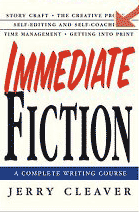 It's been a bit since I've had time to stumble across an extra that didn't feel like something to throw onto the list just because it's the end of the week ;-)
It's been a bit since I've had time to stumble across an extra that didn't feel like something to throw onto the list just because it's the end of the week ;-)Right now I'm reading Immediate Fiction
He gets into *how* to fix story problems. In the introduction he describes how the writing instructors he encountered focused on telling him his writing was wrong and that a writer needed to feel when writing was right. He kept asking *how*? Over the years he did manage to find a process that helps.
When a scene or a story isn't working, he says, look to your five tools. (Really six if conflict is broken down.) The first are the Big Three, Want, Obstacle, Action, without which a story is going no where.
Conflict (Want + Obstacle)When analyzing a story, first ask yourself
Action
Resolution
Emotion
Showing
- "Who wants what?" If no one wants anything, that's your problem.
- "What's the obstacle?" If there is no obstacle (it can be the character, others, a big mountain) you have no conflict and no dramatic tension to move the story.
- "What's the character doing (action) to overcome the obstacle and fulfill his want?"
While he does repeat himself. Over and over. A lot ;-) It's a more practical writing book than most. (It's based on the workshops he teaches so may account for the repetition which probably comes across in person as emphasis for the evening's writing exercises than it does in a book.) He's not saying anything new so much as the way he's saying it: as a set of writing tools to analyze your own writing with.
The one section that made me sit up is his analysis of why writing is so hard sometimes. It's because we need to make the characters do the opposite of what we naturally do in real life: work hard to *avoid* conflict. And I realized avoiding conflict is what my characters do a lot ;-) They do what makes sense. But what a story needs, what makes the readers turn pages, is forcing the character to plunge head first into conflict. The characters *needs* to upset his life to get to his goal.
"Ask yourself how you get along in society, how you survive when you're out in the world. By making as much trouble as possible every change you get? No, you survive by avoiding conflict, by playing it safe, by being careful, by dong the exact opposite of what you ned to do to write exciting stories.
"Writing compelling stories goes against the grain of all our socialized, civilized training. Creating fiction is an antisocial act. .... If you take the easy way out, which yo will be prone to do, consciously or unconsciously, because of your civilized nature and your affection for your character, if you take that easy way, you character will not act in a compelling way, your story will sag, and the reader will leave. So you must be cruel to your characters. It's the only way."
(Of course there's cruelty and there's character revealing cruelty! Running over a child's puppy is cruel. What you want are more obstacles in the character's path. Obstacles that challenge and illuminate in a way that makes sense in your story.)
No comments:
Post a Comment